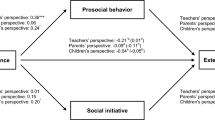Abstract
The developmental consequences of homelessness have only recently begun to be investigated. This study examined the effects of homelessness on the self-concept, behavioral symptoms, and emotional development of preschoolers. Self-concept was examined using the Pictorial Scale of Perceived Competence and Acceptance for Young Children and teachers rated behavioral symptoms using the Child Behavior Checklist. Emotional development was also examined. Results showed that homeless preschoolers have lower self-concepts and display more deviant behaviors on the Child Behavior Checklist than housed preschoolers of the same socioeconomic status. Recognition and understanding of emotion, however, were similar in both groups.
Similar content being viewed by others
References
Achenbach, T. M., & Edelbrock, C. S. (1981). Behavioral problems and competencies reported by parents of normal and disturbed children aged 4–16.Monographs of the Society for Research in Child Development, 46(1) (Serial No. 188).
Achenbach, T. M., & Edelbrock, C. S. (1983).Manual for the Child Behavior Checklist and Revised Child Behavior Profile. Burlington: University of Vermont, Department of Psychiatry.
Bassuk, E. L., & Rubin, L. (1987). Homeless children: A neglected population.American Journal of Orthopsychiatry, 57, 279–286.
Bassuk, E. L., & Rosenberg, L. (1990). Psychosocial characteristics of homeless children and children with homes.Pediatrics, 85, 257–286.
Beck, A. T. (1967).Depression: Clinical, experimental and theoretical aspects. New York: Harper & Row.
Beck, A. T. (1974). The development of depression: A cognitive model. In R. J. Friedman & M. M. Katz (Eds.),The psychology of depression (pp. 3–27). Washington, DC: Holt, Rinehart, & Winston.
Breakey, W. R., & Fisher, P. J. (1990). Homelessness: The extent of the problem.Journal of Social Issues, 46(4), 31–47.
Coopersmith, S. (1967).The antecedents of self-esteem. San Francisco: Freeman.
DiBiase, R. (1989).A scale for measuring emotional experience in pre-school children. Unpublished manuscript, Suffolk University, Boston, MA.
Ferster, C. B. (1974). Behavioral approaches to depression. In R. J. Friedman & M. M. Katz (Eds.),The psychology of depression: Contemporary theory and research (pp. 151–156). Washington, DC: Holt, Rinehart, & Winston.
Harlow, H. F., & Harlow, M. K. (1966). Learning to love.American Scientist, 54, 244–272.
Harlow, H. F., & Suomi, S. J. (1971). Production of depressive behaviors in young monkeys.Journal of Autism and Childhood Schizophrenia, 1, 246–255.
Harter, S., & Pike, R. (1984). The Pictorial Scale of Perceived Competence and Social Acceptance for Young Children.Child Development, 55, 1969–1983.
Hetherington, E. M., Cox, M., & Cox, R. (1979). Stress and coping in divorce: A focus on women. In J. E. Gullahorn (Ed.),Psychology and women: In transition (pp. 149–176). Washington, DC: V. H. Winston and Sons.
Johnson, J. H. (1982). Life events as stressors in childhood and adolescence. In B. Lahey & A. Kazdin (Eds.),Advances in clinical and child psychology (Vol. 5) (pp. 101–118). New York: Plenum Press.
Kovacs, M., & Beck, A. T. (1978). Maladaptive cognitive structures in depression.American Journal of Psychiatry, 135, 525–533.
Lewinsohn, P. M. (1974). A behavioral approach to depression. In R. J. Friedman & M. M. Katz (Eds.),The psychology of depression: Contemporary theory and research (pp. 157–159). Washington, DC: Holt, Rinehart, & Winston.
Melnick, V. L., & Williams, C. S. (1987, May).Children and families without homes: Observations from thirty case studies. Washington, DC: University of the District of Columbia, Center for Applied Research and Urban Policy.
Molnar, J., & Klein, T. (1988).Home is where the heart is: The crisis of homeless children and families in New York City. New York: Bank Street College of Education.
Neiman, L. (1988). A critical review of resiliency literature and its relevance to homeless children.Children's Environments Quarterly, 5, 17–25.
Rescorla, L., Parker, R., & Stolley, P. (1991). Ability achievement and adjustment in homeless children.American Journal of Orthopsychiatry, 61, 210–220.
Rosenman, M., & Stein, M. L. (1990). Homeless children: A new vulnerability.
U.S. Conference of Mayors. (1987).The continuing growth of hunger, homelessness, and poverty in American cities: A 26 city survey. Washington, DC: Author.
Zussman, J. S. U. (1977). Situational determinants of parental behavior.Dissertation Abstracts International.
Author information
Authors and Affiliations
Additional information
Research was supported by a grant from the Department of Health and Human Services, Administration for Children and Families. The authors would like to express great appreciation to teachers Michaelene Blazak and Mary Ellen Ranta, to homeless case aide Elizabeth Davico, and to research assistant Carolyn Boumilla-Agostini for their assistance and dedication.
Rights and permissions
About this article
Cite this article
DiBiase, R., Waddell, S. Some effects of homelessness on the psychological functioning of preschoolers. J Abnorm Child Psychol 23, 783–792 (1995). https://doi.org/10.1007/BF01447477
Received:
Issue Date:
DOI: https://doi.org/10.1007/BF01447477




